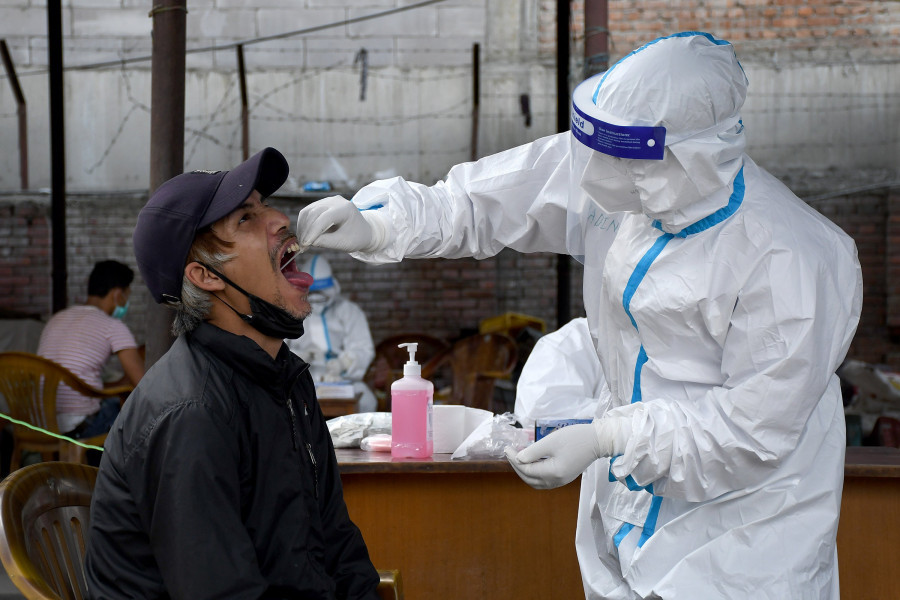National
Health officials raise alarm as country sets new single-day coronavirus spike with 2,020 cases
With the festival season approaching and long-route travel ban lifted, health officials warn unwitting infected travellers from Kathmandu Valley could spark new waves of infections across the country.
Anup Ojha
Nepal set a single-day coronavirus case record on Friday with 2,020 infections, taking the total number of Covid-19 cases to 61,593. Kathmandu Valley also recorded the highest daily spike with 859 new infections, of which 698 cases were confirmed in Kathmandu, 82 in Bhaktapur and 79 in Lalitpur districts.
Despite the four-month long lockdown and the subsequent prohibitory orders, there has been no let-up in the rise of coronavirus cases in the Valley. As of Friday, the Valley has reported 15,138 infections. More than two-thirds of these cases (12,640) were confirmed after the three district administrators of the Valley imposed prohibitory orders starting August 19 midnight.
Health officials say the Covid-19 situation in the Valley, particularly in Kathmandu, is a cause for major concern, because with the increase in infections, the number of infected people who are out of contact is also growing.
Gyan Bahadur Oli, the Covid-19 focal person at the Public Health Division of Kathmandu Metropolitan City, says more than 500 coronavirus infected people are currently out of contact.
On an average, 12 people in the city whose test results come positive for the coronavirus infection could not be reached.
“Among the infected who are out of contact also include the individuals who had come from out of the Valley,” said Oli.
Until Thursday, the city has diagnosed 6,363 coronavirus cases and conducted 14,551 contact tracing.
Health officials have long been struggling with the problem of deliberate misidentification by the people undergoing coronavirus tests, making the job of contact tracing troublesome.
Hari Kunwar, chief of the Public Health Division at Kathmandu Metropolitan City, says many people give false personal details to the health officials fearing stigmatisation from their communities in case their test results come positive.
“In many cases we have found the people who live in rented rooms and apartments not giving the accurate information. They apparently fear being kicked out by their landlords,” said Kunwar. “We did trace some of the people with the aid of police, but that is not possible now.” said Kunwar.
Anthropologist Suresh Dhakal said only social counselling and better awareness about Covid-19 can help solve this problem, as infected people fear what others might say or do. He suggested that the government and other stakeholders inform and educate people about the disease.
Meanwhile, the contact tracing job has been made doubly difficult after the government resumed long-distance bus and domestic flight services from Thursday onwards ahead of the Dashain festival.
Health officials fear that with the resumption of long-haul transportation service there is a chance of the out-of-contact infected people in Kathmandu spreading the virus in several parts of the country, prompting outbreaks in remote areas and new waves of infections in places where the cases are on the wane.
“As the festival season approaches, there is a high risk of unwitting infected people carrying the virus to different towns and villages of the country,” Dr Sher Bahadur Pun, virologist at Sukraraj Tropical and Infectious Disease Hospital in Teku, told the Post.
He warns that there is a risk of the repeat of the Covid-19 outbreaks witnessed earlier by many Tarai districts which were attributed to the people who had returned home from various coronavirus-stricken cities in India—only this time, the spreaders are likely to be from the Kathmandu Valley.
“Earlier, many Tarai districts had become the coronavirus hotspots through carriers who had come from India. Now, Kathmandu has become the most infected place,” Pun said. “There is a danger of the virus travelling from Kathmandu to various parts of the country, even those places which are relatively safe so far.”
The government has not enforced any strict health and safety guidelines for people travelling from the Valley to other parts of the country, except for the one passenger per seat rule.
Health officials have advised that the government conduct PCR tests on each passenger before he or she is allowed to travel, but the suggestion has largely been neglected.
According to the Metropolitan Traffic Police Division, a total of 12,813 people left the Valley on Friday alone.
“The number will be higher in coming days,” said Rameshwor Yadav, spokesperson for the division. He said on the first day of operation of long route buses only half the number of passengers had left the Valley.




 9.51°C Kathmandu
9.51°C Kathmandu.jpg)














